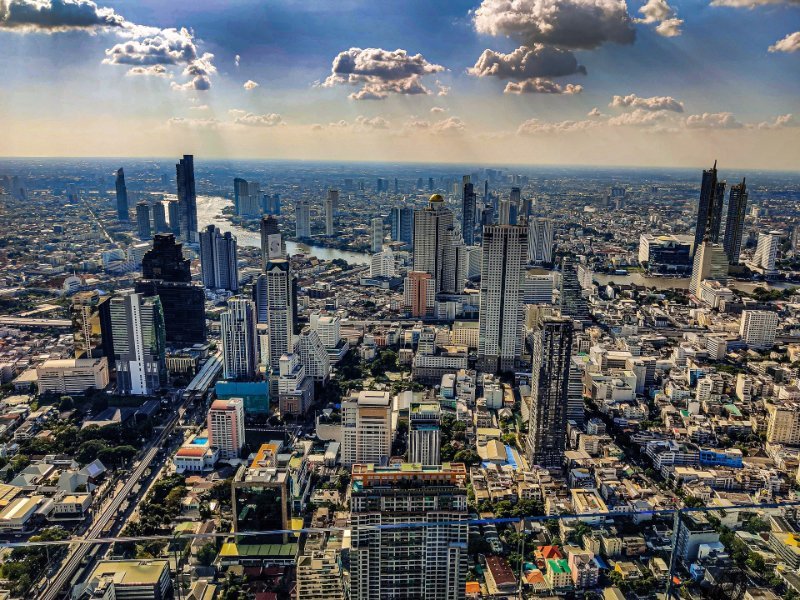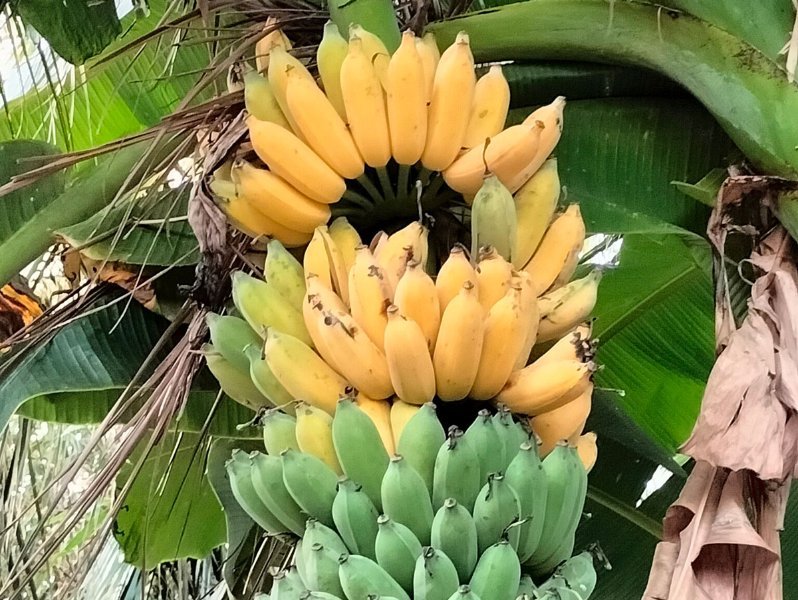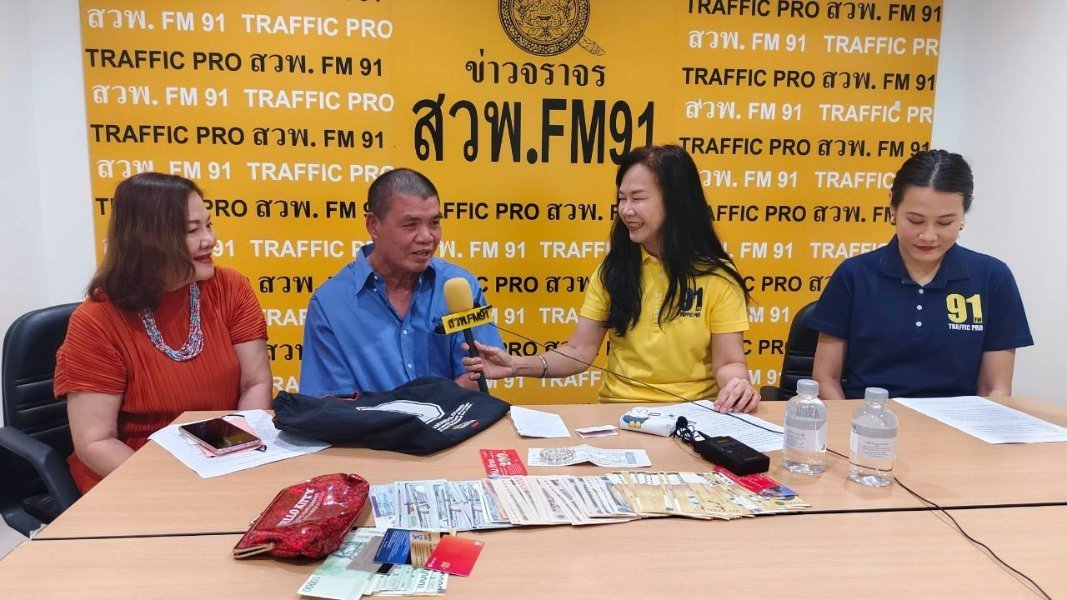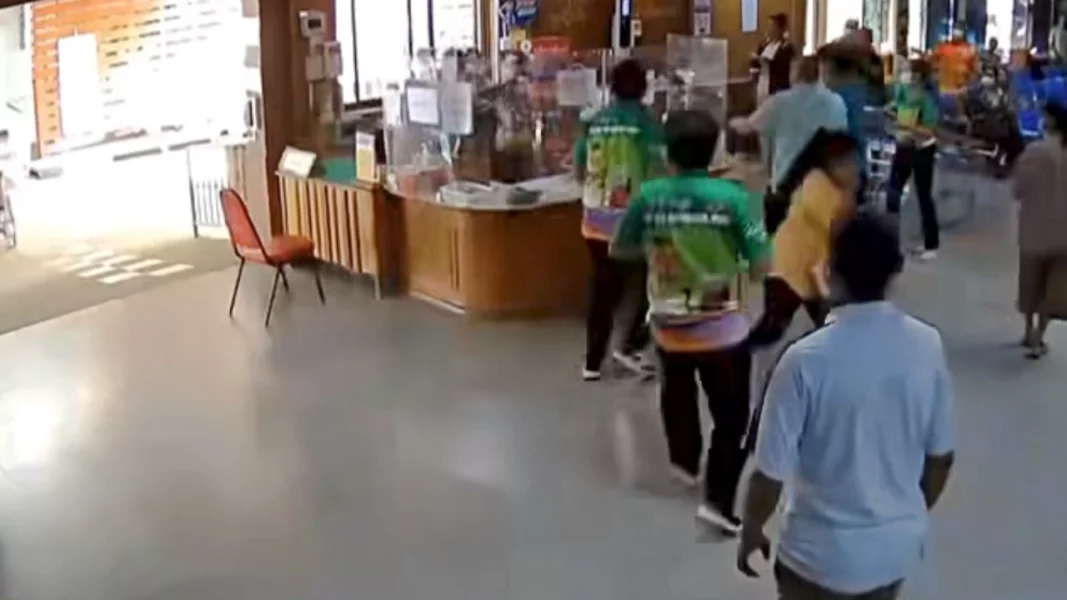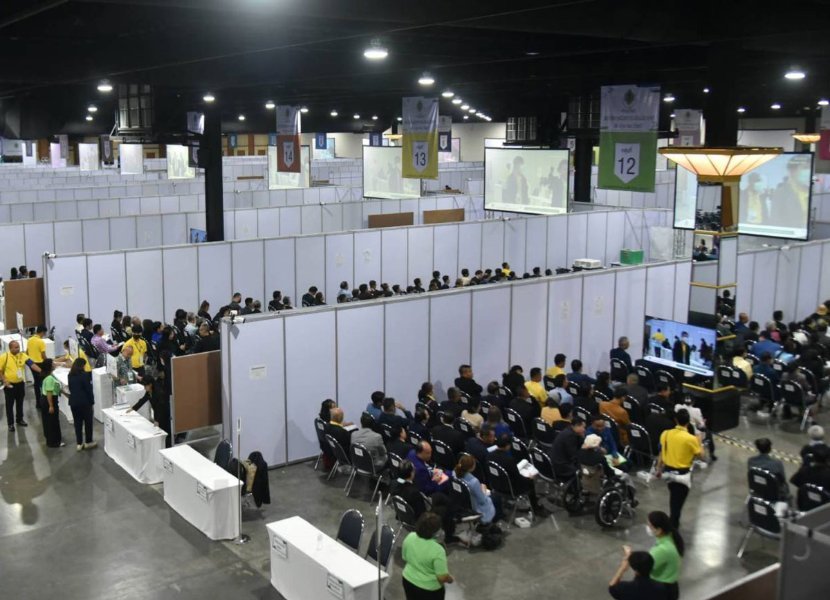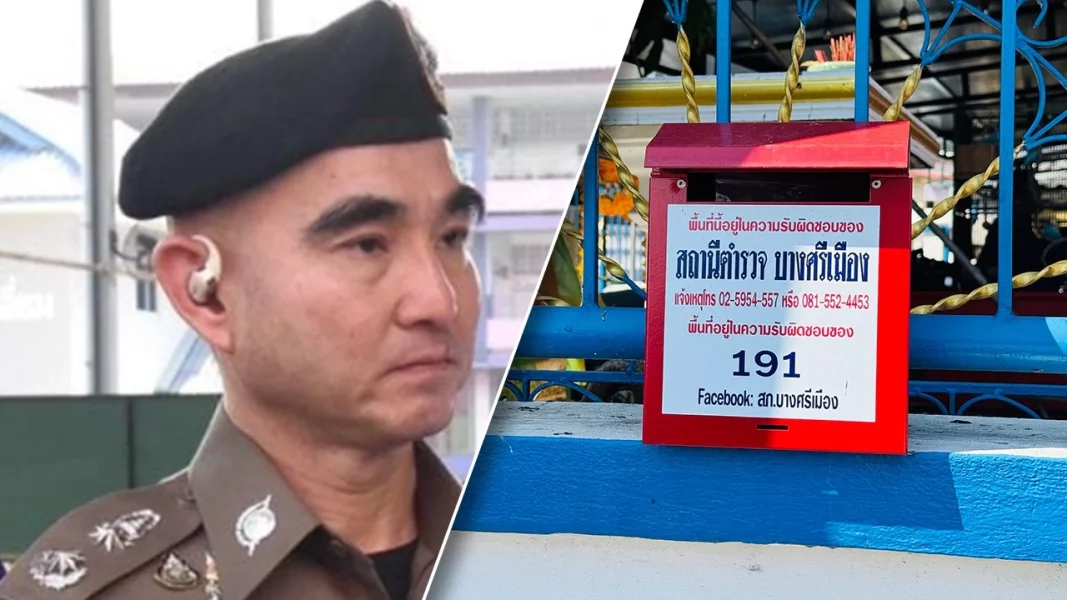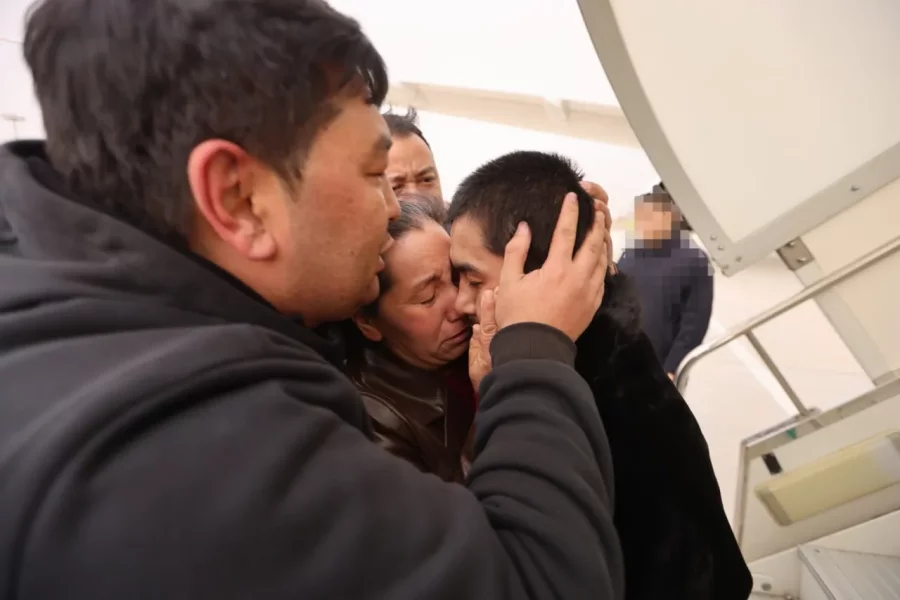-
Posts
393,375 -
Joined
-
Last visited
-
Days Won
804
Content Type
Events
Forums
Downloads
Quizzes
Gallery
Blogs
Everything posted by webfact
-
Picture courtesy of Skyscraper Center In a bold crackdown in Bangkok, authorities have apprehended several condominium owners and real estate agents accused of illegally renting out properties under the guise of short-term accommodations. The rush of recent arrests comes as part of a concerted effort to reinforce the nation's Hotel Act, aiming to curb unauthorised real estate activities that have flourished in recent times. The Department of Provincial Administration, spearheading the operation, has cited numerous infractions where property owners have bypassed standard hotel regulations, offering their apartments for short stays without the required license. According to Mr. Chaiwat, the department's director-general, these unauthorised rentals are in breach of the Hotel Act, which explicitly mandates that any property offering lodging to transient guests must possess a hotel licence. Caught in the legal net are both owners and intermediaries who have been casually letting out accommodations on platforms like Airbnb, contravening local regulations. Mr. Chaiwat further clarified that culprits might face severe repercussions, including up to a year behind bars or fines reaching 20,000 Thai Baht (approximately $570 USD), in addition to a daily penalty of 10,000 Thai Baht (around $285 USD) for continued violations. The crackdown sheds light on an issue that's been brewing beneath the surface in Thailand's popular tourist hotspots, where affordable rentals are in demand, but legislative oversight is lacking. This grey area has often led to friction between local authorities wanting to maintain order and those keen on boosting tourism revenue. However, amidst the controversy, there seems to be policy movement towards remedial action. The Pheu Thai Party, with Chanin Rungtanakiat as a deputy spokesman, has indicated that they are formulating proposals to amend the existing Hotel Act. Their vision is to legalise and regulate small-scale non-hotel accommodations, much like similar European models, which could provide a sustainable framework for such enterprises to flourish legitimately. Critics argue that these reforms could potentially open up more controlled avenues for property owners while boosting local economies. Supporters believe it could also enhance the quality of tourist accommodations by ensuring safety and standards are met consistently. This current situation highlights the tightrope that administrations worldwide must walk—balancing economic growth, resident concerns, and legal integrity. Ideally, Thailand’s move to amend the legislation would provide more clarity and streamline processes to accommodate both business interests and regulatory requirements. Nonetheless, until such changes are enshrined in law, authorities are likely to continue their vigilance, ensuring compliance and safeguarding the interests of legitimate hospitality providers. As the story evolves, stakeholders from all sides are undoubtedly watching closely, waiting to see how this legal and financial ripple affects the broader Thai real estate and tourism landscape, reported Bangkok Post. -- 2025-03-07
- 64 replies
-
- 10
-

-

-

-
Casino file photo courtesy: Wikipedia In a move likely to spark debate, the Thai Ministry of Finance has indicated that the draft Entertainment Complex Bill will propose that only individuals with a bank balance of at least 50 million baht may enter Thai casinos. Despite differing opinions within the government, Deputy Finance Minister Julapun Amornvivat emphasised that parliament will have the final say on this controversial clause. The proposed requirement follows recommendations from the Council of State, the government's legal advisory body. This stipulation is part of an effort to regulate the casino industry while considering potential societal impacts. Mr Julapun, however, argues against this hefty financial threshold, stating it overlooks the significant number of Thais who gamble abroad. He proposed an alternative that involves proof of tax payment for three consecutive years and a 5,000 baht entry fee. Concerns have been raised regarding the potential for casinos to become breeding grounds for grey and black market operations. Critics fear this could position Thailand as a hub for illegal financial activities. Mr Julapun dismissed these worries, asserting that strict national regulations and standards will be enforced. Moreover, he believes that reputable foreign investors, involved in multiple global markets, would be deterred from engaging in illicit activities due to the risk of losing licences in other countries. The Entertainment Complex Bill, encompassing casino operation guidelines, is a key policy of the Pheu Thai Party, the leading party in the current government. It aims not only to regulate gambling but also to enhance Thailand's tourism appeal by establishing entertainment hubs alongside its existing nature-based attractions. Foreign investment interest, particularly for projects valued over 100 billion baht, is being approached with caution. Investors will be required to operate transparently and comply with stringent regulations, which include periodic reviews every five years to ensure lawful operations. This legislative approach is intended to attract only credible international participants, thereby maintaining the integrity of the Thai financial and tourist landscapes. As the bill makes its way to parliament, the debate over the entry requirement reflects a broader conversation about balancing economic growth with social responsibility. While the objective is to boost tourism and economic activity, the details of the regulations will ultimately shape the landscape of Thailand's evolving entertainment complex industry. Parliament's eventual decision will be crucial in setting the tone for this new chapter in Thailand's tourism and gambling sectors, reported Bangkok Post. -- 2025-03-07
-
Picture courtesy of Wikipedia In light of tumbling rice prices, the Thai government plans to encourage rice farmers to diversify their crops by cultivating bananas. Commerce Minister Pichai Naripthaphan announced this initiative on Thursday, suggesting that bananas could provide a lucrative alternative due to their high yield and demand in international markets such as Japan. Currently, Thailand produces around 8,000 tonnes of bananas annually, with the potential to export approximately 2,000 tonnes. The aim is to tap into Japan's burgeoning demand for bananas, estimated at one million tonnes a year, creating a promising opportunity for Thai farmers to supplement their income. The proposal, however, faced scepticism in parliament. People's Party MP Narongdech Ularnkul questioned the government's commitment to rescuing the plunging rice prices, urging Minister Pichai to consult with the Agriculture and Cooperatives Ministry before advising farmers to make the switch to bananas. Amidst these discussions, Narongdech voiced concerns about the leadership within the National Rice Policy and Management Committee, questioning if the current government's leadership fully appreciates the farmers’ plight, especially since the post traditionally held by the prime minister is now occupied by Finance Minister Pichai Chunhavajira. To aid rice farmers, Pichai revealed plans to offload rice stockpiles through agreements with African countries and China. Discussions with India and Vietnam are also on the horizon to form strategies for stabilising rice prices. Additionally, a proposal to support rice prices by offering farmers an extra 1,000 baht per tonne for off-season rice awaits Cabinet approval. Coupled with current market rates, farmers could potentially receive around 9,500 baht per tonne. As the government explores diversification to bolster incomes, the debate underscores the broader challenge of balancing immediate market intervention with long-term agricultural sustainability. Ultimately, the success of this initiative may hinge on effective collaboration across governmental agencies and addressing the farmers' real-time concerns, reportedn Bangkok Post. -- 2025-03-07
-
File photo for reference only. The Transport Ministry of Thailand has delayed the transfer of three significant airports—Krabi, Udon Thani, and Buri Ram—from the Department of Airports to Airports of Thailand Plc (AOT). This decision comes amid concerns about income generation and operational continuity. Deputy Transport Minister Manaporn Charoensri stated on Thursday that plans to hand over the management of these airports would be postponed indefinitely. Cited reasons include these airports' role as vital income sources for the Department of Airports, a necessity that could serve as a blueprint for enhancing the operations of 25 other regional airports. The minister elaborated that reconsidering the pros and cons of the transfer is crucial. However, a ministry insider disclosed that the plan was shelved due to issues related to employee preferences and property rights—department personnel are reportedly uneasy about transitioning to state enterprise roles, and there are complications about transferring state assets to a public enterprise like AOT. Moreover, the department believes retaining these airports will enable it to self-finance its 25 other airports, reducing the reliance on government funds. Previously, on 30 August 2022, the Cabinet had authorised the transfer of these airports to AOT, but the switch was never executed. In the wake of this decision, Deputy Minister Manaporn has tasked the Department of Airports with the development of all 28 state-owned airports under its management to foster self-sustaining income. She has emphasised the eradication of any undue influence, particularly in airports where such issues have been problematic, like Krabi. The initiative aims to create distinctive identities for these airports, tying them to local tourism and enhancing connectivity with public transport networks. The planned development will start with Krabi airport, which has been plagued with issues of influence and exploitation. The development plan also calls for airports to conduct fair bidding processes to allow private firms to manage commercial spaces effectively, thus boosting revenue streams. Additionally, renovation committees are to be formed, including representatives from local government agencies, such as provincial land transport offices, to streamline the integration of airport transportation with nearby tourist sites and enhance overall operational efficiency. This multipronged approach aims to ensure the long-term economic viability and improved service quality of these key regional airports, all while preserving governmental oversight and control, reported The Nation. -- 2025-03-07
-
- 1
-

-
Picture courtesy of FM91 A Bangkok taxi driver has been lauded for his integrity and kindness after finding and returning a bag containing nearly 160,000 baht to a Japanese tourist. The story unfolded when Chum Kamwiangsa, a 63-year-old driver from Phrae, discovered the forgotten item in his taxi. After picking up a passenger from Wat Arun and dropping them off at Pansuk Lane, the next fare noticed the left-behind bag. Realising it was not his, Chum quickly took the initiative to bring it to the Sorp Vor Por FM91 radio station to track down the owner. Inside the black tote was a red wallet and a small white purse holding various currencies, including US dollars, Japanese yen, Korean won, and Vietnamese dong, equating to about 160,000 baht. Identification inside revealed the owner as a Japanese tourist named Ayaka. The radio station staff at Sorp Vor Por FM91 acted swiftly, utilising contacts with local agencies and a central Bangkok hotel identified from documents in the bag. They confirmed the bag belonged to a Japanese visitor who had stayed in the hotel but returned to Japan. The hotel coordinated to collect the bag on the owner's behalf. Chum was initially unaware of the amount of money involved, concerned mainly about returning the belongings to prevent any inconvenience to the tourist. Relieved once the owner was found, he entrusted Sorp Vor Por FM91, a station he regularly tuned into, to handle the return process. The tourist expressed profound gratitude upon learning her belongings were found and safeguarded, showing appreciation for Chum’s honesty and the efforts made to return the bag. She anticipates returning to Thailand next month, reassured by the kindness she experienced, reported Daily News. -- 2025-03-07
-
Japanese Tourist's 160,000 Baht Returned by Honest Taxi Driver Picture courtesy of FM91 A Bangkok taxi driver has been lauded for his integrity and kindness after finding and returning a bag containing nearly 160,000 baht to a Japanese tourist. Full story: https://aseannow.com/topic/1353809- japanese-tourists-160000-baht-returned-by-honest-taxi-driver/
-
Transfer of Three Airports to AOT Delayed by Transport Ministry File photo for reference only. The Transport Ministry of Thailand has delayed the transfer of three significant airports—Krabi, Udon Thani, and Buri Ram—from the Department of Airports to Airports of Thailand Plc (AOT). This decision comes amid concerns about income generation and operational continuity. Full story: https://aseannow.com/topic/1353804-transfer-of-three-airports-to-aot-delayed-by-transport-ministry/
-
Thailand Eyes Banana Farming to Support Struggling Rice Farmers Picture courtesy of Wikipedia In light of tumbling rice prices, the Thai government plans to encourage rice farmers to diversify their crops by cultivating bananas. Commerce Minister Pichai Naripthaphan announced this initiative on Thursday, suggesting that bananas could provide a lucrative alternative due to their high yield and demand in international markets such as Japan. Full story: https://aseannow.com/topic/1353802-thailand-eyes-banana-farming-to-support-struggling-rice-farmers/
-
50m Baht Casino Entry Requirement Up for Future Debate Casino file photo courtesy: Wikipedia In a move likely to spark debate, the Thai Ministry of Finance has indicated that the draft Entertainment Complex Bill will propose that only individuals with a bank balance of at least 50 million baht may enter Thai casinos. Full story: https://aseannow.com/topic/1353800-50m-baht-casino-entry-requirement-up-for-future-debate/
-
Udon Thani Hospital Staff Assaulted by Patient Seeking Treatment Picture courtesy of Thai Rath Hospital staff in Udon Thani have been attacked again, with an incident at Nam Som Hospital drawing attention. A hospital worker was assaulted by a man seeking medical assistance, prompting calls on social media for measures to prevent such occurrences. Full story: https://aseannow.com/topic/1353823-udon-thani-hospital-staff-assaulted-by-patient-seeking-treatment/
-
Picture courtesy of Thai Rath Hospital staff in Udon Thani have been attacked again, with an incident at Nam Som Hospital drawing attention. A hospital worker was assaulted by a man seeking medical assistance, prompting calls on social media for measures to prevent such occurrences. On 6th March, a video of the incident was widely shared online. Deputy Prime Minister's Assistant, Dr Thanakrit Jitareerat, posted the footage, highlighting the ongoing dangers faced by healthcare staff. The assault took place on 5th March at around 8:56 AM at Nam Som Hospital. A female hospital assistant was attacked by a male patient while she was distributing queue tickets, resulting in injuries to her arm, face, and head. The incident has prompted numerous public responses, with many urging strict legal action to set an example. There are growing calls for enhanced protective measures for hospital staff and for laws to be enforced stringently to deter such behaviour in the future, reported Thai Rath. -- 2025-03-07
-
Termite Infestation Causes Roof Collapse in Rayong Family's Home Photo via Facebook/ เพจรู้เรื่องเมืองระยอง A family in Rayong's Mueang district narrowly escaped injury this week when their home's roof collapsed due to severe termite damage. The incident occurred on Tuesday at a house in Soi Koh Kloy 5. The family of three escaped unharmed, but the collapse left the house's central region with significant structural damage. Full story: https://aseannow.com/topic/1353777-termite-infestation-causes-roof-collapse-in-rayong-familys-home/
-
Thai-Chinese High-Speed Rail Project Faces 350-Day Delay Pictures courtesy of Matichon The Thai-Chinese high-speed railway project has encountered another setback, with a 350-day extension approved by the State Railway of Thailand (SRT) board due to rental buildings hindering construction. This delay moves the completion deadline to March 10, 2026, for the Bangkok to Nakhon Ratchasima stretch of the railway, affecting contract sections 3 to 5 of phase 1. Full story: https://aseannow.com/topic/1353761-thai-chinese-high-speed-rail-project-faces-350-day-delay/
-
Thaksin’s Request to Leave Thailand for Indonesia Blocked by Court Photo courtesy of Thairath Online Former Prime Minister Thaksin Shinawatra encountered a significant legal hurdle today, as the Criminal Court denied his request to travel to Indonesia for the upcoming ASEAN meeting. Full story: https://aseannow.com/topic/1353775-thaksin’s-request-to-leave-thailand-for-indonesia-blocked-by-court/
-

THAILAND LIVE Thailand Live Thursday 6 March 2025
webfact replied to webfact's topic in Thailand Live
to continue: Thailand Live Friday 7 March 2025 https://aseannow.com/topic/1353721-thailand-live-friday-7-march-2025/ -
Expert Calls for Urgent Review of Thailand's Alcohol Policies File photo In an urgent appeal to policymakers, a leading expert has called for a comprehensive review of Thailand's stringent alcohol regulations, highlighting their socio-economic impact and questionable effectiveness. The debate centres around the country's notorious alcohol curfew and its potential contribution to a thriving underground market. Full story: https://aseannow.com/topic/1353720-expert-calls-for-urgent-review-of-thailands-alcohol-policies/
-

THAILAND LIVE Thailand Live Thursday 6 March 2025
webfact replied to webfact's topic in Thailand Live
Expert Calls for Urgent Review of Thailand's Alcohol Policies File photo In an urgent appeal to policymakers, a leading expert has called for a comprehensive review of Thailand's stringent alcohol regulations, highlighting their socio-economic impact and questionable effectiveness. The debate centres around the country's notorious alcohol curfew and its potential contribution to a thriving underground market. Full story: https://aseannow.com/topic/1353720-expert-calls-for-urgent-review-of-thailands-alcohol-policies/ -
File photo In an urgent appeal to policymakers, a leading expert has called for a comprehensive review of Thailand's stringent alcohol regulations, highlighting their socio-economic impact and questionable effectiveness. The debate centres around the country's notorious alcohol curfew and its potential contribution to a thriving underground market. Thailand has long maintained a strict regimen on alcohol sales, prohibiting purchases during the mid-afternoon hours from 2 pm to 5 pm. Ostensibly, these laws aim to curb alcohol consumption and associated social issues. However, Dr. Somchai Suriwong, a renowned public health specialist, has brought these regulations into question, suggesting they may do more harm than good. Dr. Somchai argues that the curfews could inadvertently fuel illegal sales, as many consumers turn to the black market when facing legal purchasing restrictions. This underground market, he claims, is not only difficult to regulate but also deprives the government of significant tax revenue—potential funds that could be redirected towards public health initiatives. According to Dr. Somchai, "Current regulations are not achieving the intended results. Instead, there's an increase in illicit trade and a missed opportunity for public health investment." The economic impact is not negligible either, with legitimate businesses, particularly those in the hospitality and retail sectors, facing reduced revenues during curfew hours. Hoteliers and restaurateurs have voiced frustrations, noting that such restrictions not only deter tourists but also dent their bottom line during peak afternoon hours when leisure travellers typically unwind. In a recent proposal to the government committee overseeing alcohol legislation, Dr. Somchai advocated for a shift in policy. He suggests extending permitted sales times in hotels that comply with established safety standards and commit to cooperative measures aimed at combatting drunk-driving incidents. For instance, hotels might be required to provide transport or designate safe drinking zones to qualify for extended licensing. Enabling responsible consumption rather than restricting access could yield better outcomes, argues Dr. Somchai. He proposes using a portion of the additional tax revenue from extended sales times—which could amount to significant sums in Thai Baht—to bolster road safety campaigns and addiction support services. Public opinion remains divided. Some fear that extended hours might exacerbate alcohol-related issues, while others echo Dr. Somchai’s sentiments, appreciating the potential economic and social benefits. This call for a policy overhaul comes against the backdrop of Thailand's evolving strategies in addressing public health challenges whilst seeking to bolster its tourism sector. Whether this will spark a re-evaluation of alcohol laws remains to be seen, yet the debate is likely to persist as stakeholders balance health concerns with economic vitality, reported Bangkok Post. -- 2025-03-06
-

THAILAND LIVE Thailand Live Thursday 6 March 2025
webfact replied to webfact's topic in Thailand Live
Election Probe Shelved: EC Rejects Senate Vote-Fixing Inquiry Picture courtesy of Thai PBS The Election Commission (EC) in Thailand has declined to join a crucial meeting concerning a potential investigation into alleged vote-fixing during last year's Senate election. Instead of attending, they dispatched a formal letter insisting that they possess exclusive authority over such matters, as per the organic law on the EC. Full story: https://aseannow.com/topic/1353724-election-probe-shelved-ec-rejects-senate-vote-fixing-inquiry/ -
Picture courtesy of Thai PBS The Election Commission (EC) in Thailand has declined to join a crucial meeting concerning a potential investigation into alleged vote-fixing during last year's Senate election. Instead of attending, they dispatched a formal letter insisting that they possess exclusive authority over such matters, as per the organic law on the EC. This decision aligns with the EC's position, affirmed internally on March 4, that it alone is responsible for any investigations related to electoral irregularities, leveraging Section 49 of the law to assert their jurisdiction over the proceedings. Deputy Prime Minister Phumtham Wechayachai, chairing the Department of Special Investigation's (DSI) board, had initially postponed a verdict on this matter from February 25 to today's meeting, seeking further clarity. Now, the EC's absence throws the board's plans into disarray. When approached for comment, Phumtham remained tight-lipped, noting, "I have not yet seen the EC’s written response," hinting at potential friction between governmental departments. The vote-fixing allegations emerged from a cluster of unsuccessful candidates, including those on a reserve list, who claim the EC has been sluggish in addressing the accusations. These charges are centered around senators affiliated with the Bhumjaithai Party, a significant player in the governing coalition. Further fuelling the controversy, Senator Chattrawat Saengphet retracted comments he made earlier in the week, initially cautioning against DSI's probe. He suggested that any move perceived as encroaching on the EC's domain might breach democratic practices. In subsequent clarifications, he maintained that his comments were hypothetical and not accusatory. Amidst this political theatre, red-shirt leader Jatuporn Prompan hinted that rejecting government motions for the DSI investigation might illustrate diminished influence over the administration. In stark contrast, the government seems eager to proceed, stoking tensions further. With political factions closely eyeing the unfolding drama, the EC's refusal to engage today leaves the Senate election probe hanging in uncertainty. The meeting's outcome will likely dictate the next steps in what is brewing into a contentious political saga. As authorities bicker over investigative rights, the public watches on, grappling with the broader implications of governance, justice, and political integrity in Thailand. With no clear resolution in sight, today's developments add yet another layer to the country's complex political landscape, reported The Thaiger. -- 2025-03-06
-

THAILAND LIVE Thailand Live Thursday 6 March 2025
webfact replied to webfact's topic in Thailand Live
Condo in Nana Area Used for Illegal Rentals and Prostitution, MP Says Picture courtesy of 3Plus NEWS MP Phanthira Nwamjerm from the People's Party has exposed a troubling situation unfolding in a condominium in Bangkok's Nana area, which is reportedly being rented out for prostitution on a daily basis. Full story: https://aseannow.com/topic/1353715-condos-in-nana-area-used-for-illegal-rentals-and-prostitution-mp-says/ -
Picture courtesy of 3Plus NEWS MP Phanthira Nwamjerm from the People's Party has exposed a troubling situation unfolding in a condominium in Bangkok's Nana area, which is reportedly being rented out for prostitution on a daily basis. This disclosure follows numerous complaints from local residents about black women frequently escorting different men into the building, raising concerns over safety and prompting some residents to move out. Mr Phanthira has urged the government to amend the Condominium Act to enhance the decision-making power of unit owners, while also suggesting that the Ministry of Digital Economy and Society register platforms like Airbnb to ensure that foreigners renting out properties pay appropriate taxes. During his tenure as an MP, Mr Phanthira received several complaints about foreign nationals renting condos daily, causing disturbances such as loud parties and drug use, specifically with cannabis. Such activities often lead to police intervention. He noted that Arab nationals visiting a nearby hospital frequently opt for condo rentals instead of hotels, leading to signs within some buildings discouraging daily renters due to safety concerns. Some properties have even resorted to facial recognition technology for enhanced security. The root of the issue lies in the current Condominium Act, which allows a small minority of residents—just a third—to influence decisions, necessitating a legal overhaul to give all stakeholders a voice. In addition to the safety concerns, complaints have surfaced regarding the renting of condos to sex workers, particularly black women seen entering the building with different men. Such occurrences, although indirect, have created an atmosphere of unease among permanent residents, questioning whether they need to relocate for their peace of mind. Phanthira has raised concerns about the ineffective enforcement of current laws which fail to safeguard residents adequately, especially considering proposals to allow foreigners to own up to 75% of condominium units. This issue of foreign ownership may further marginalise Thai residents who are currently already struggling under the 49% ownership cap due to the use of nominees by foreign owners. Phanthira has called for proactive measures from the authorities, particularly concerning daily condo rentals, questioning whether immigration laws are being properly enforced. He suggests random inspections of condos, especially those along the railway lines, beyond reacting to media reports. Moreover, Phanthira addressed the daily rental practices via Airbnb, highlighting the need for registration and taxation compliance by foreign property owners profiting from such rentals, reported 3Plus NEWS. He urged the Ministry of Digital Economy and Society to work towards a regulatory framework that ensures these individuals contribute taxes for their business activities in Thailand. -- 2025-03-06
- 71 replies
-
- 21
-

-

-

-

THAILAND LIVE Thailand Live Thursday 6 March 2025
webfact replied to webfact's topic in Thailand Live
'Red Box Scandal' at Thai Vape and Kratom Shop Picture courtesy of Thai Rath Police in Nonthaburi to Investigate 'Red Box' Appearance at Shop Authorities in Nonthaburi are investigating the appearance of a 'red box'—a police symbol meant for high-security areas—found prominently outside a house used for selling kratom drinks and e-cigarettes. Full story: https://aseannow.com/topic/1353712-red-box-scandal-at-thai-vape-and-kratom-shop/ -
Picture courtesy of Thai Rath Police in Nonthaburi to Investigate 'Red Box' Appearance at Shop Authorities in Nonthaburi are investigating the appearance of a 'red box'—a police symbol meant for high-security areas—found prominently outside a house used for selling kratom drinks and e-cigarettes. The issue came to light when a team from the Region 1 police, led by Major General Worachat Saenkham, raided a property in Bang Srimueang on 4th March. The house was reportedly a hub for producing kratom drinks and distributing e-cigarettes to local youths. During the raid, substantial amounts of the illegal goods were seized, and suspects taken into custody. However, officials were surprised to find a 'red box' from Bang Srimueang Police Station attached to the property's fence. This unexpected discovery has reached the ears of Police Major General Kittinates Thanantaveesin, Chief of Nonthaburi Police, who has now ordered an urgent investigation. The Bang Srimueang Police Station has been tasked to provide a detailed report within three days, as the sale of these substances is strictly prohibited under government orders for a crackdown. The findings will help determine whether local law enforcement had any involvement or oversight issues, reported Thai Rath. -- 2025-03-06
-
Picture courtesy of Thai Rath Thailand’s Deputy Prime Minister, Phumtham Wechayachai, alongside Justice Minister Tawee Sodsong, is set to embark on a mission to China’s Xinjiang region on March 18. This visit aims to evaluate the situation of 40 Uyghurs recently deported after a prolonged 11-year stay in Thai detention. This international watchdog examines both the actions undertaken and the criticism they've sparked. The Thai government’s decision to deport the group on February 27 attracted significant international attention and disapproval. The government asserts their actions followed international legal protocols, challenging claims they acted to appease China despite alternative offers. Phumtham highlights that no country stepped forward with a relocation plan within the past decade, although recent reports by Reuters suggest otherwise. According to the news outlet, Canada, the United States, and Australia had shown willingness to resettle the Uyghurs. However, the matter didn’t advance due to Thai authorities' concerns about diplomatic repercussions with Beijing. Through his statements, Phumtham reiterated that Thailand had responsibly housed Uyghurs in conformity with international regulations. Over the years, discussions were held with the UN High Commissioner for Refugees (UNHCR) to potentially confer refugee status upon them. The government insists its hands were tied due to legal constraints which demanded either repatriation to China or relocation to an alternative willing host nation. Initially, in 2015, of the 350 Uyghurs who sought refuge in Thailand, around 170 were permitted entry to Turkey. These consisted primarily of women, children, and the elderly. China, accepting 109 men soon after, cited verified citizen status linked to specific addresses. Whereabouts of these men remain unknown. The remainder continued under Thai custody until recent deportation action. Mr Phumtham clarified that no official refugee designation by the UNHCR allowed classification as illegal immigrants, necessitating their return. Upon doing so, assurances were secured from Chinese authorities pledging humane treatment and safeguarding human rights, countering international apprehensions regarding potential risks or torture. Mr Phumtham, along with Pol Col Tawee and Foreign Affairs Minister Maris Sangiampongsa, feels assured in their approach. The expectation is that commitment to Uyghur welfare will be substantiated during the forthcoming inspection, echoing a broader commitment to national integrity and international relations. In conclusion, the ministers' planned visit underscores the gravity of the situation. Continued scrutiny from the international community ensures that the transparency and ethical treatment of the Uyghur people remain firmly on the global agenda, reported Bangkok Post. -- 2025-03-06




